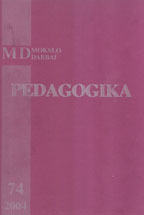Skirtingų Lietuvos edukacinių kontingentų rūkymo įpročių socialinės prielaidos
Social Bacground Related to Smoking Habits in Different Educational Contingents in Lithuania
Author(s): Vida Juškelienė, Stasė UstilaitėSubject(s): Education
Published by: Vytauto Didžiojo Universitetas
Keywords: 16-18 year adolescences; smoking; social conditions; secondary and vocational schools.
Summary/Abstract: With the intention to develop preventive measures this study was designed to determine prevalence of smoking and smoking related psychosocial family conditions among 16— 18 schoolchildren. Sample size represents two educational groups — secondary and vocational school's pupils in Lithuania, total number 2867. Group of secondary schools consisted of 1401 schoolchildren, 837 (59,7%) girls and 564 (40,3%) boys. Most of them were citizens - 1290 (92,1%), 63 (4,5 %) - from small city, 48 (3,4%) - from country. In the group of vocational schools were 1466 respondents, 542 (37,0%) girls and 924 (63,0%) boys, 51,4% from city educational institutions, 15,1% — small cities and 33,5% - country schools. Schoolchildren completed the anonymous questionnaire. They described their smoking habits, also pointed out education and employment conditions of their parents, specified status of the family (complete/incomplete). Family economical conditions were estimated considering adolescent's personal definition of family richness, and also child's having/lack spending money for food. The study estimated substantial differences among educational groups. It was found, that 25,6% of pupils at secondary schools and 50,7% of the coevals at vocational schools smoke at least once a week. Boys smoke significand more often than girls in both groups. The findings also revealed considerable psychosocial differences between two educational contingents. Lower parental education, unemployment, lower level of richness and poor psychological climate at the family were more characteristic to vocational schools. Study results demonstrated that higher parental education do not ensure healthy lifestyles of their children. However economical welfare of the family likely influence better spending money conditions for children, and higher prevalence of frequent smoking among adolescence. Therefore, it is recommended for parents to give more concern how pocket money are expended. Psychological family surroundings were significantly associated with smoking habits of the adolescences. Frequent smoking was more prevalent among those, who reported poor psychological climate at home, lack of honest communication among adolescent and parents. Considering study results and analysis of scientific publications it is recommended differentiation of educational and social preventive measures according the educational contingent.
Journal: Pedagogika
- Issue Year: 2004
- Issue No: 74
- Page Range: 104-109
- Page Count: 6
- Language: Lithuanian

